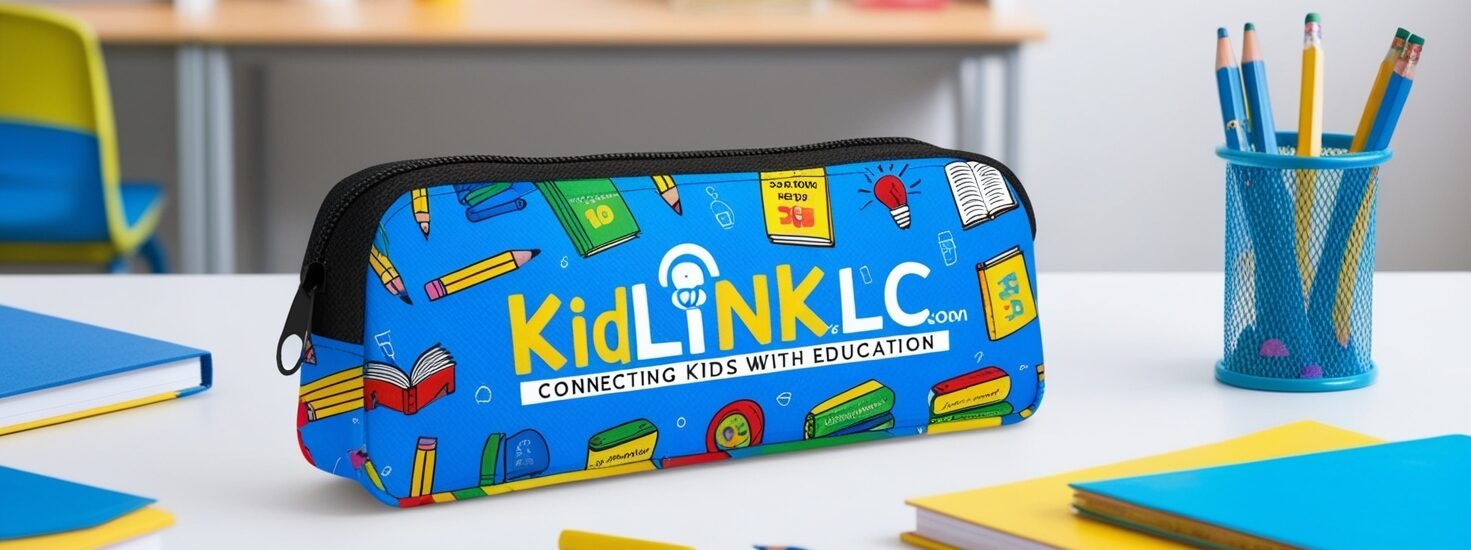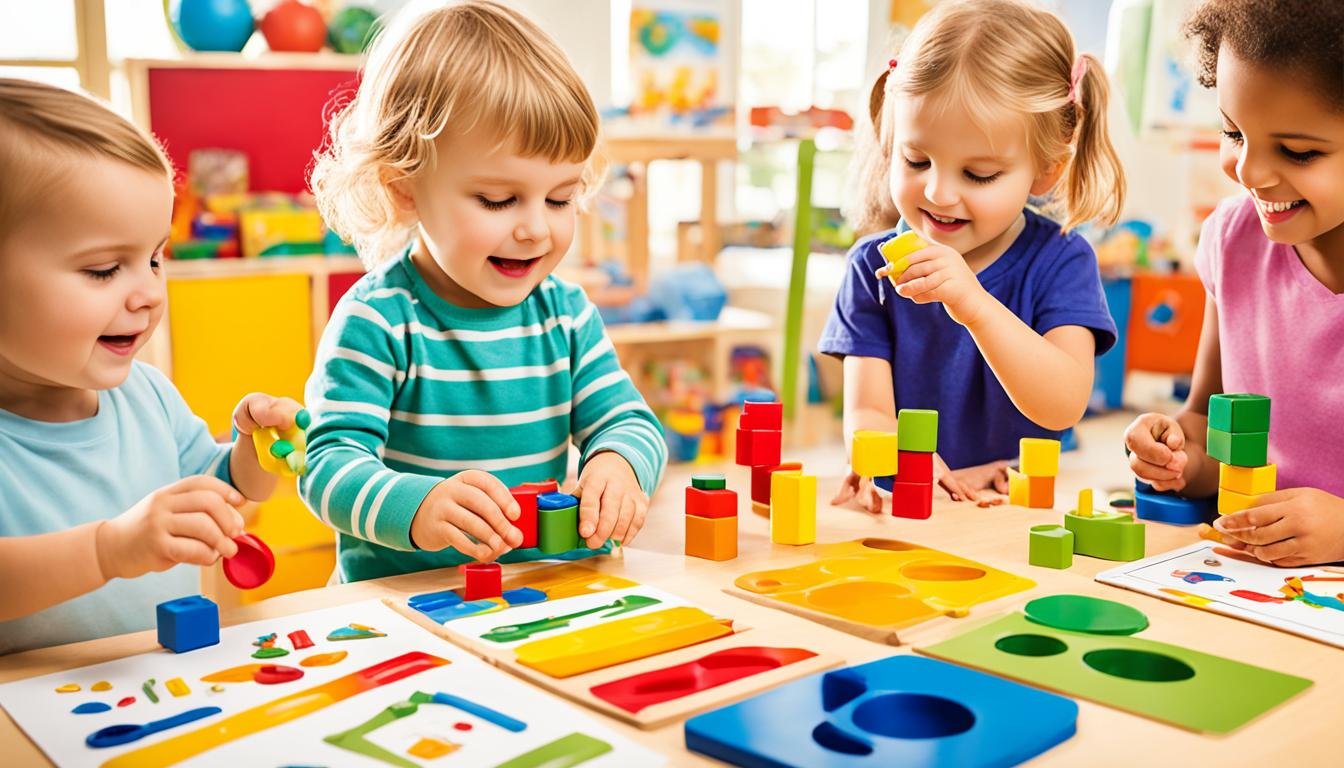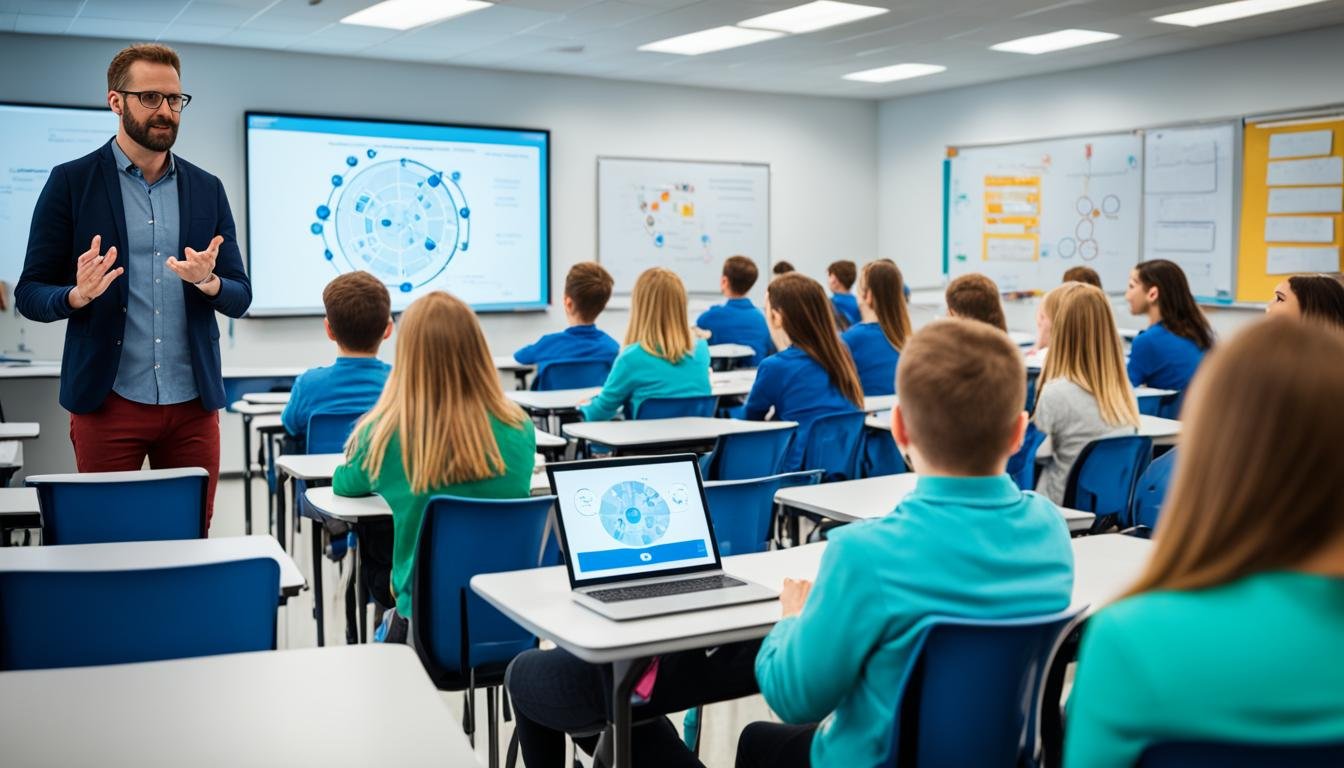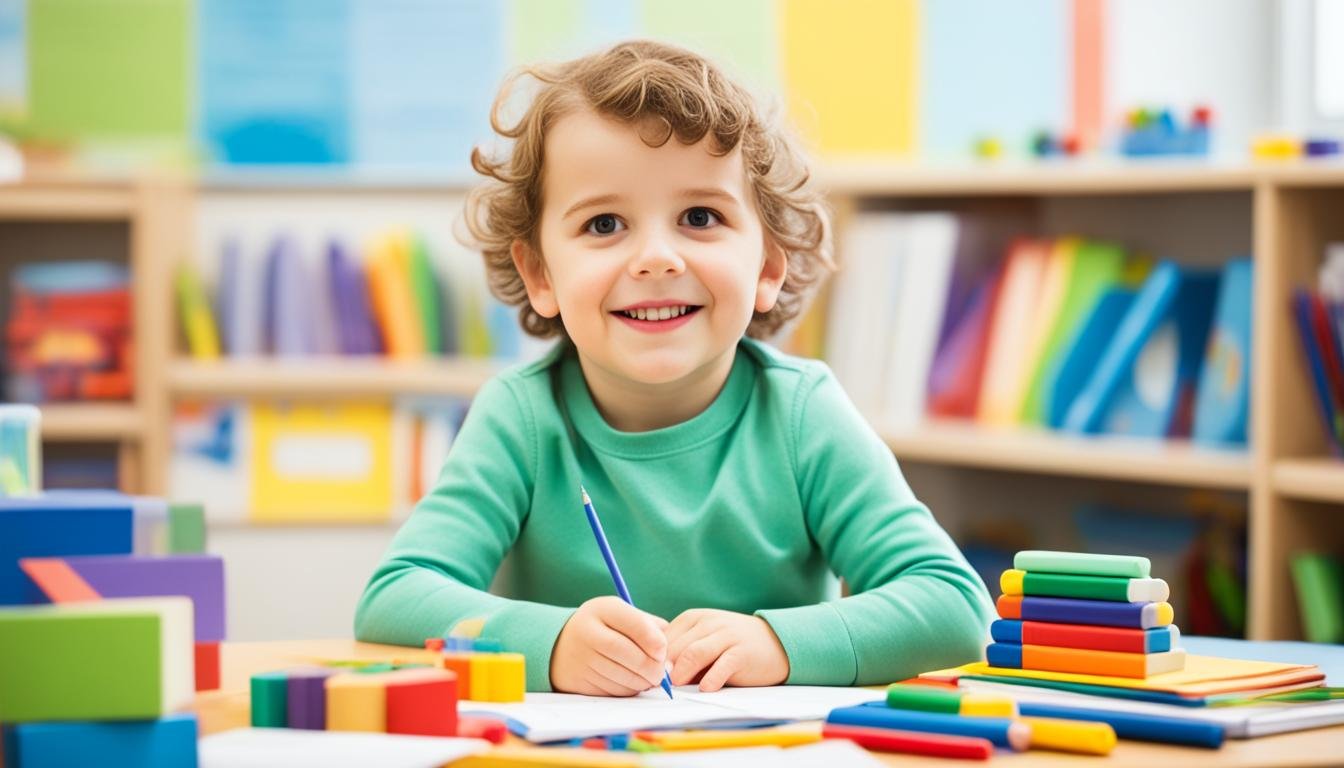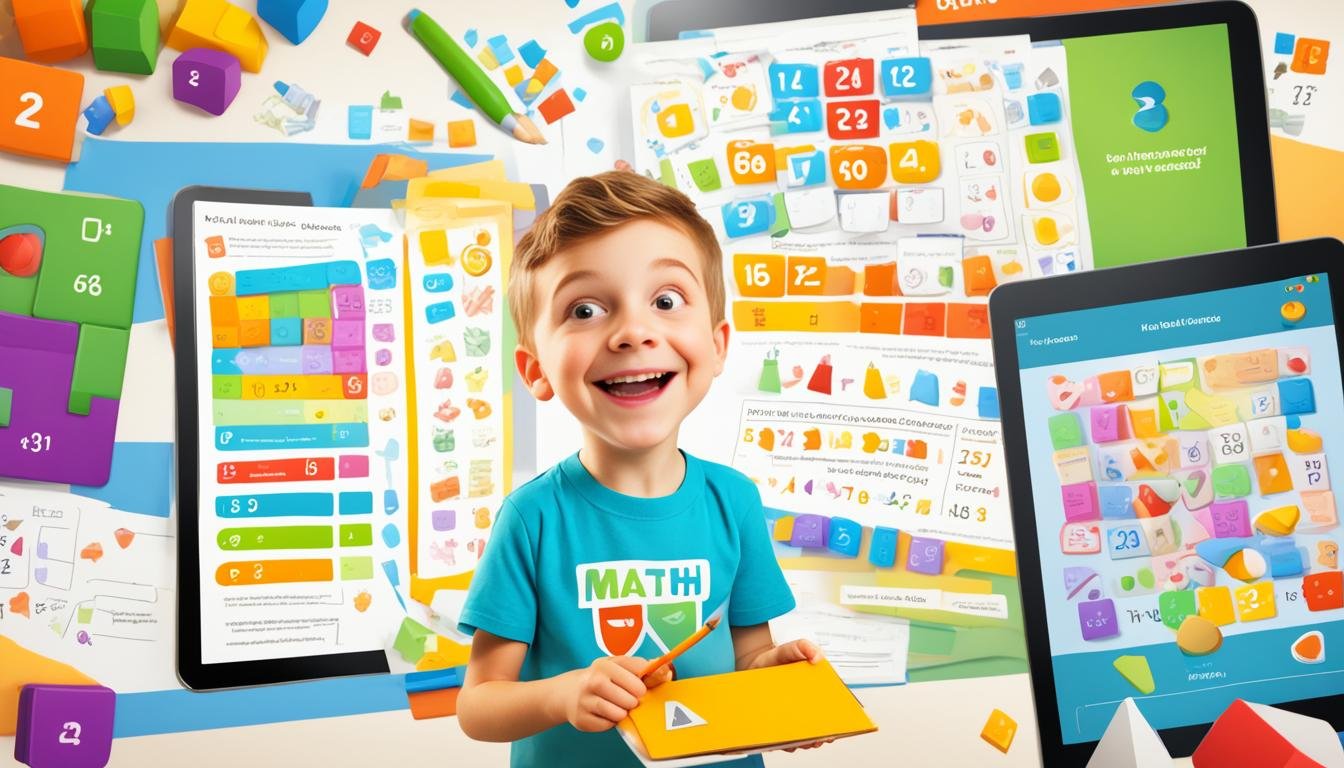How Can Parents Help Their Children Develop Good Study Habits Early On?
Have you ever thought about why some kids do well in school and others don’t? It often comes down to parents helping their kids start good study habits early. Setting up a strong base for learning skills early helps kids do well in school and keeps them loving to learn. Parents can greatly influence their child’s learning and time management by being involved in their education. Studies show that good study skills are habits that can be taught, and with the right support, every kid can do well in school without feeling too stressed.
Key Takeaways
- Parents play a crucial role in establishing effective study habits early.
- Effective study skills can lead to greater academic success in children.
- Creating a conducive learning environment is essential for study skills development.
- Encouraging time management can help children thrive academically and personally.
- Engaging with educational resources, like how parents can assist their children in learning good study, can enhance understanding.
The Importance of Developing Good Study Habits Early
Starting good study habits early sets the stage for a lifetime of learning. Kids start to show interest in learning and grow their minds. Reading early helps them get ready for school challenges, making them more likely to succeed.
When kids learn how to study well, they manage their time better. This lets them keep up with school, hobbies, and personal life. I’ve seen that kids with good study habits feel less stressed in school. They focus better and do well in their studies, which makes learning rewarding.
Learning starts with small, steady steps. Encouraging young learners to use good study methods helps them learn more and feel more confident. By getting help, like using tips from academic success strategies, they can get even better at studying.
| Age Group | Recommended Study Habits | Benefits |
|---|---|---|
| 5-10 years | Reading daily, using colorful resources, setting short goals | Improved vocabulary, enhanced creativity, foundational skills |
| 11-14 years | Organizing study materials, practicing active learning | Better retention, increased engagement, reduced anxiety |
| 15-18 years | Developing time management, utilizing study apps and tools | Stronger self-discipline, preparedness for college, academic confidence |
Understanding Your Child’s Learning Needs
It’s key to know what makes my child learn best to help them do well in school. Each child learns in their own way, which affects how they study. Some do great in a structured class, while others prefer a more free-form approach. By spotting issues like not being interested or having trouble focusing, I can give them the right kind of help.
Talking openly about school helps me understand how to help my child. By asking them about their thoughts on different subjects, I can learn what they need. It’s important to make them feel safe sharing their likes and challenges.

- Assessing my child’s interests and strengths
- Exploring different learning resources and styles
- Adapting study habits to match their learning pace
- Encouraging self-reflection to recognize barriers
By focusing on these areas, I can help my child develop good study habits. This sets a strong base for their school success. Giving them support that fits their needs helps spark their curiosity and makes them more independent in learning.
Creating a Productive Study Environment
Creating a good study area is key for a child’s school success. A well-planned study space boosts focus and efficiency. By paying attention to the study area and keeping supplies organized, my child can do better in school.
Choosing an Effective Study Space
Choosing the right study spot is crucial. I make sure it’s quiet, bright, and free from distractions. Comfort is key for focus, so I think about ergonomics when setting up the space. Having a special area for studying shows my child it’s time to focus. This helps them stay in the right mindset for their work.
Organizing Study Supplies
Organizing study items is very important. Having things like notebooks, pens, and books ready makes work smoother. This way, my child wastes less time looking for things and can focus more on their studies. A clean space also makes them feel proud of their work. For more tips, I check out resources like creating a productive study environment.
| Element | Importance |
|---|---|
| Study Space | Enhances focus and minimizes distractions |
| Ergonomics | Supports comfort, reducing physical strain |
| Organized Supplies | Promotes efficiency and saves time |
| Lighting | Improves visibility, reducing eye strain |
Establishing a Consistent Study Routine
Creating a consistent study routine is key to learning well. Regular study times give my child the structure they need to do well in school. This helps them manage their time and build good study habits.
The Benefits of Regular Study Times
Regular study times help my child get used to focusing during study times. With a set study schedule, they know when to study, which cuts down on procrastination. Over time, studying becomes a normal part of their day.
Incorporating Breaks for Optimal Focus
Breaks during study sessions are important for staying focused and motivated. I suggest using the Pomodoro Technique. This means studying for 25 minutes and then taking a 5-minute break. This approach keeps the mind fresh and helps my child remember information better.
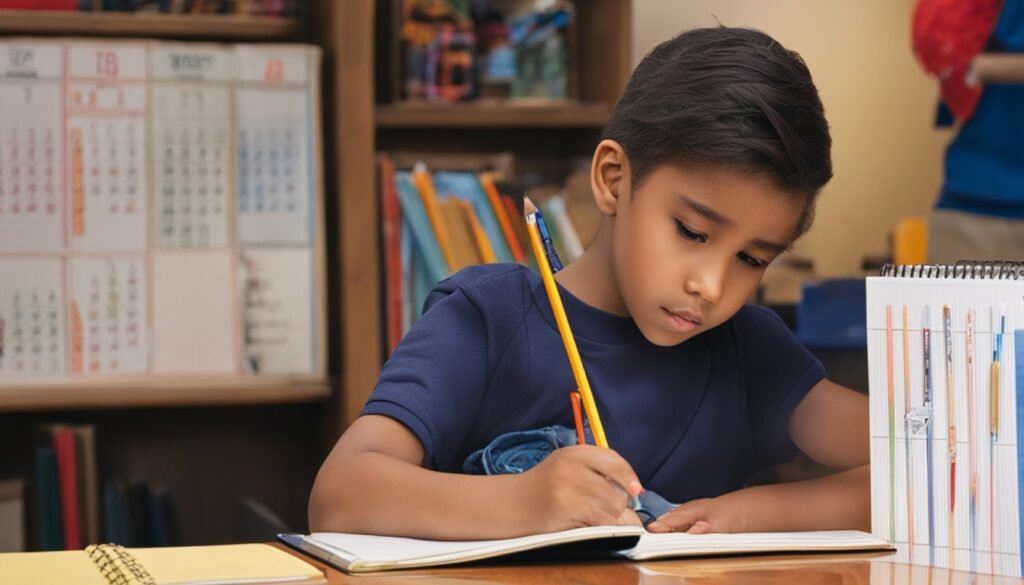
A balanced study schedule boosts productivity and supports my child’s well-being. It makes learning fun. By mixing a structured routine with breaks, I’m teaching my child good study habits for the future.
Effective Learning Strategies for Academic Success
Using the right learning strategies is key to doing well in school. These methods help us understand and remember information better. By using active reading and note-taking, I can make learning easier for my child.
Utilizing Active Reading Techniques
Active reading means diving deeper into the text. Highlighting important points, asking questions, and summarizing what we read helps us get the most out of it. Talking about the material with others makes learning fun and interactive.
Implementing Note-Taking Methods
Good note-taking is important for keeping our thoughts organized and reviewing material. The Cornell method is great because it breaks notes into cues, notes, and a summary. It helps my child focus on the main ideas and study quickly before exams. Mind mapping is another way to see information clearly, making complex topics easier to remember.
| Technique | Description | Benefits |
|---|---|---|
| Active Reading | Engaging with the text through highlighting, questioning, and summarizing. | Enhances comprehension and retention of material. |
| Cornell Method | A structured note-taking system that divides notes into organized sections. | Facilitates easier review and understanding of key concepts. |
| Mind Mapping | A visual representation of information connecting related ideas. | Helps in organizing thoughts and improving memory recall. |
Building Time Management Skills for Studying
Learning how to manage time well can really improve a student’s school life. A homework planner is a great tool for this. It helps students keep track of their work and deadlines. This way, they can focus on what needs to be done and stay on track.
Breaking big projects into smaller steps also helps. It makes them feel less overwhelming. This method turns big tasks into smaller, easier pieces.
Creating a Homework Planner
A homework planner keeps study sessions organized and helps students stay on top of their work. I suggest using both digital and traditional planners. Digital ones have reminders and are easy to change, while traditional ones help you feel the tasks you need to do.
Adding due dates to your planner lets students see when things are due. This helps them plan better.
Breaking Down Projects and Assignments
For big projects, breaking them down is key. Start by identifying main tasks and setting achievable goals for each. Seeing progress helps students feel good as they hit milestones.
Using charts can make tracking easier. To learn about using resources, check out the terms of usage.

| Task | Due Date | Status |
|---|---|---|
| Research Topic | Oct 10 | Complete |
| Create Outline | Oct 15 | In Progress |
| Draft Essay | Oct 22 | Not Started |
| Revise Draft | Oct 25 | Not Started |
| Submit Assignment | Oct 30 | Not Started |
Encouraging my child to focus on what’s important and see their progress boosts their confidence. As they get better at managing their time, they’ll be ready for any challenge. By supporting these habits, I help my child become more independent in their learning.
Encouraging the Use of Study Techniques for Success
Using effective study techniques can really help a child learn and remember things better. By trying out different methods, I can help my child find what suits them best. Flash cards and practice tests are two great tools for this.
Practicing with Flash Cards
Flash cards are great for memorizing things, like vocabulary or important concepts. They make studying active and fun. I suggest making flash cards together, focusing on key terms or images from their lessons.
This way, studying becomes more interactive and enjoyable. It also improves their memory skills.
Using Practice Tests Effectively
Practice tests are also key to doing well in school. They mimic real exams, helping my child get used to the test format. Practicing under the clock can lessen test-day nerves.
It’s good to go over the test results together. We can talk about what they did well and what they need to work on. This helps them learn more and feel more confident.
Assist Your Child in Setting Study Goals
Setting study goals is key to good learning habits. As a parent, I help my child set SMART goals. SMART stands for Specific, Measurable, Achievable, Relevant, and Time-bound. This method makes goals clear and keeps them motivated for both short and long goals.
The Importance of Short and Long-term Goals
Short-term goals, like finishing homework each day, help with daily focus. Long-term goals, such as getting ready for a big exam, keep the big picture in mind. Seeing these goals helps my child understand their progress and feel they can reach them.
Tracking Progress and Celebrating Achievements
Keeping track of progress is key to staying motivated. Using a checklist or planner lets my child see how far they’ve come. Celebrating small wins makes learning fun and builds a positive view of studying.
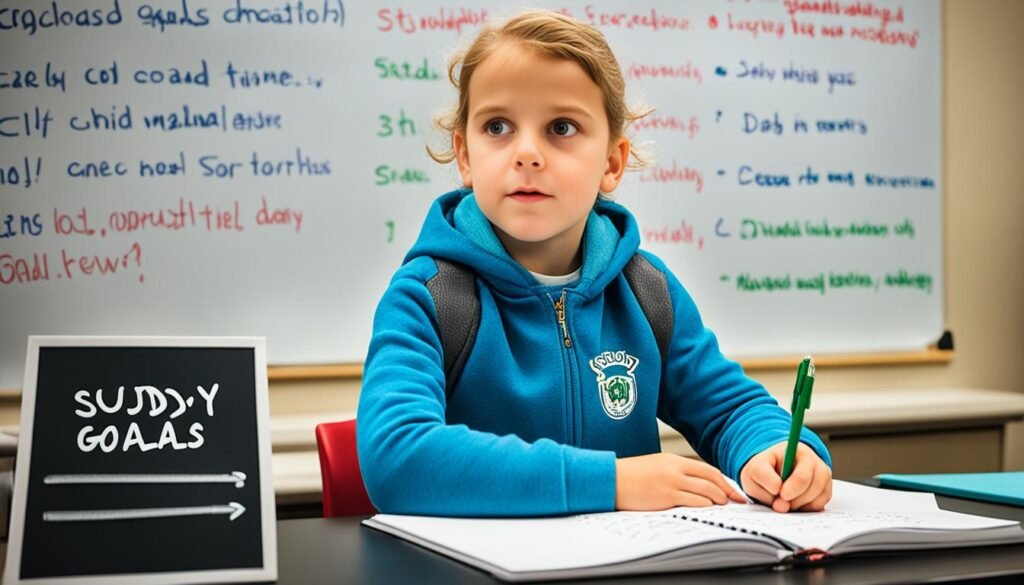
Looking into more tips on study habits can help make learning better. For more on developing good study habits, check out this detailed guide.
| Goal Type | Description | Timeframe |
|---|---|---|
| Short-term | Daily homework assignments | Days to Weeks |
| Long-term | Preparing for semester exams | Months |
| Medium-term | Improving grades in specific subjects | Weeks to Months |
Helping Children Stay Motivated to Study
Motivating kids to study can be tough, but it’s key for their learning journey. I aim to create a space where they view challenges as chances to grow. By valuing the learning itself, not just the grades, they build resilience and curiosity.
Develop a Positive Attitude Towards Learning
It’s important to focus on effort, not just results. When my kids hit a snag, I see it as a chance to learn. This way, they learn to value every step of their school journey. Reflecting on their progress helps build this positive mindset.
Providing Regular Praise and Encouragement
Praise and encouragement make a big difference. Celebrating small wins, like finishing homework or understanding a tough concept, boosts their motivation. Acknowledging their hard work builds confidence and readiness for harder tasks. A steady stream of positive feedback is key to keeping them excited about learning.
For more tips on keeping kids motivated, check out helpful resources on staying motivated to.
https://www.youtube.com/watch?v=HJOKI5cxx18
| Strategy | Description | Impact on Children |
|---|---|---|
| Positive Framing | Present challenges as opportunities for growth. | Enhances motivation and resilience. |
| Celebration of Achievements | Recognize and celebrate small victories. | Boosts confidence and willingness to tackle tasks. |
| Consistent Praise | Offer praise for effort and persistence, not just results. | Fosters a supportive and nurturing learning environment. |
Teaching Children to Avoid Distractions
Distractions can really get in the way of studying well. As parents, we are key in teaching our kids how to avoid distractions while studying. Too many devices in their study spots often lead to tech distractions. By setting aside focused study times with fewer gadgets, kids can better concentrate on their tasks. These focused moments are key for doing well in school.
Eliminating Technology Distractions
Setting clear rules about tech use during study times is a good strategy. I like to make sure there are specific times when devices are off or kept away from where they study. This helps my child stay away from social media and other tech distractions, letting them focus on their studies.
Using Music or White Noise as a Tool
Some kids do better with some background noise while they study. Using calming music or white noise can make a great study space. These focus and concentration techniques help block out other sounds that might distract them. Trying out different sounds can help my child find what helps them concentrate the most.

How to Help Children Ask for Help When Needed
Teaching kids to ask for help is key for their growth in school and life. I tell my child it’s okay to talk to teachers for help. This shows them that asking for help means they’re strong, not weak. It helps them handle challenges better.
Encouraging Communication with Teachers
Talking to teachers is a great way to help my child. When they feel they can talk to teachers, they’re more likely to share problems and ask questions. This helps them understand better and creates a supportive place for learning.
Building Peer Support Systems
Peer support is good for my child’s learning. Working with classmates lets them share knowledge and solve problems together. This builds a community feeling and shows that asking for help is a team effort.

| Strategy | Description | Benefits |
|---|---|---|
| Open Communication | Encouraging children to speak up with teachers about questions or concerns. | Builds confidence and understanding. |
| Peer Collaboration | Encouraging study groups or partnerships for shared learning. | Promotes social skills and collective problem-solving. |
| Regular Check-ins | Scheduling time for children to discuss academic struggles. | Ensures they feel supported and heard. |
By making it normal for kids to ask for help, we help them do well in school and with friends. This is done by encouraging them to talk to teachers and work with friends.
Involving Parents in the Educational Process
Parental involvement in education is key to a child’s success. By being active in school, I show my child how much I value learning. Working with teachers creates a strong support system for my child, which is vital for their growth.
Engaging with Teachers and School Activities
Connecting with teachers makes learning a team effort. I make sure to go to parent-teacher meetings and school events. This keeps me updated on my child’s progress and what they’re learning.
Building relationships with teachers helps us trust each other. It makes communication open and honest. This way, I can better support my child’s learning.
Reinforcing Learning at Home
At home, I make sure to talk about school topics every day. Asking my child about their day helps keep the conversation going. Supporting their school work, like homework or projects, shows them how important their education is.

| Action | Benefit |
|---|---|
| Engaging with teachers | Builds a supportive network |
| Attending school activities | Demonstrates commitment to education |
| Discussing school topics at home | Reinforces classroom learning |
| Supporting homework and projects | Encourages application of skills |
Recognizing the Individual Learning Paces of Children
Every child learns at their own speed, which is key to helping them do well in school. Knowing these differences helps me support my child better. By using study methods that fit their growth, they stay motivated and feel supported.
Tailoring Study Methods Based on Age
It’s important to adjust how we study based on my child’s age. Younger kids enjoy learning through play, making school fun. As they get older, I use more structured activities that boost critical thinking. This way, I make sure they understand and engage with the material.
Promoting Self-Sufficiency in Learning
Teaching my child to be independent is crucial. I aim to make them feel in charge of their learning. By giving them tasks that challenge them, they build confidence. They learn to set goals and ask for help when needed, preparing them for life-long learning.

Reviewing and Revising Study Habits Regularly
Checking how we study can really help a child do better in school. By making a plan to review study habits, I can help my child learn more effectively. We check often to see what’s working and what needs to change.
Conducting Periodic Evaluations of Habits
It’s important to look at our study methods. This helps us see what’s working and what’s not. Sometimes, my child likes some study methods more than others. Looking into this helps us find the best way for them to learn.
Making Adjustments as Necessary
Being open to changing study methods keeps my child interested. We might try different ways of studying, use new tools, or change the study area. This keeps learning exciting and lets my child feel in control of their progress.

Conclusion
Reflecting on helping kids develop good study habits shows parents are key. Setting up a good study area and using effective learning methods is important. These steps help improve learning a lot.
Motivating kids and teaching them to organize are key too. Remember, these habits help with school work and prepare them for life. With patience and support, my child can keep learning and tackle new challenges with confidence.
The foundation we create will help them do well in school and later on. Working together, we can help them love learning and do well in everything they try.
